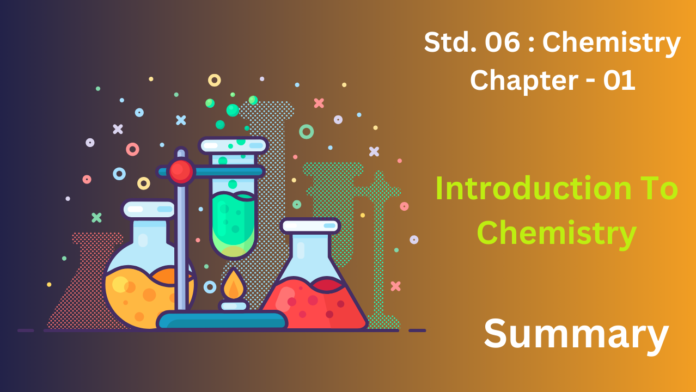ICSE Solutions for Class 6 Chemistry Chapter 1
Chemistry is the science that helps us understand what all these things are made of and how they change. It’s like being a detective, uncovering the secrets of everything around us!
Think about making a delicious lemonade. You mix water, sugar, and lemon juice. That’s a simple chemical process! The sugar dissolves in water, and the lemon juice gives it a tangy taste. Chemistry helps us understand why these things happen.
In this chapter, you’ll likely learn about:
- What is Matter? You’ll discover the different forms matter can take, like solids (like a rock), liquids (like milk), and gases (like the air).
- The Tiny Building Blocks:. Think of them like the LEGO bricks of the universe! These tiny bits are what give different substances their unique properties.
- Pure Substances and Mixtures: You’ll learn the difference between things that are made up of only one kind of particle (pure substances, like pure water) and things that are a combination of different particles (mixtures, like that lemonade!).
- Changes Around Us: Chemistry also explores how things change. You might learn about physical changes, where the substance itself doesn’t change (like ice melting into water), and chemical changes, where a new substance is formed (like wood burning and turning into ash).
- The Importance of Chemistry: You’ll probably also discover how important chemistry is in our daily lives.
So, get ready to put on your scientific thinking cap! This chapter is just the beginning of an exciting adventure into understanding the amazing world of chemistry all around you. It’s about asking “why?” and discovering the incredible answers that science provides. You’ll find that chemistry isn’t just a subject in a book; it’s the key to understanding the world we live in!
ICSE Solutions for Class 6 Chemistry Chapter 1
Exercise
Question 1.
Give two examples for each of the following substances :
(a) food preservatives
(b) fuel
(c) fungicides
(d) medicines
(e) building materials
(f) chemical war weapons
Answer:Two examples of :
(a) Food preservatives:
- Sodium benzoate
- Potassium sorbate
(b) Fuel:
- Gasoline
- Natural gas
(c) Fungicides:
- Copper sulfate
- Maneb
(d) Medicines:
- Paracetamol
- Amoxicillin
(e) Building materials:
- Cement
- Steel
(f) Chemical war weapons:
- Sarin
- Mustard gas
ICSE Solutions for Class 6 Chemistry Chapter 1
Question 2.
Give short answers :
(a) What is science ?
(b) What is chemistry ?
(c) What is fuel ?
(d) How is chemistry helpful in improving the health of human beings ?
(e) What is alchemy?
(f) What kind of experiments did Alchemists do?
(g) What is ‘Philosopher’s stone’ ?
(h) What is the main difference between alchemy and chemistry?
(i) Name the chemicals which help in increasing food production.
(j) Name six such products, which we use daily.
(k) How is the knowledge of chemistry important to mankind ?
Answer :
- Science: A methodical way to learn about nature.
- Chemistry: The science of matter and its changes.
- Fuel: A substance that releases energy when it reacts chemically.
- Chemistry’s importance: Crucial for medicine.
- Alchemy: An old practice focused on transmutation and immortality.
- Alchemists’ experiments: Involved heating, mixing, and distilling.
- Philosopher’s stone: A mythical substance with transformative powers.
- Alchemy vs. Chemistry: Alchemy lacks scientific method, while relies on careful watching and doing experiments.
- Fertilizers and pesticides: Chemicals for increasing food production.
- Everyday chemicals: Salt, sugar, cooking gas, soap, toothpaste, and plastics.
- Chemistry’s role: Key to improving life and advancing technology.
ICSE Solutions for Class 6 Chemistry Chapter 1
3)What is the contribution of chemistry in the following fields ?
(a) Industry
(b) Clothings
(c) Cosmetics
(d) National Defence
(e) Medicines
Answer:Here are the contributions of chemistry in those fields:
(a) Industry: Chemistry is the backbone of countless industries, from petroleum refining and plastics production to fertilizers and building materials. It provides the raw materials, develops efficient processes, and creates innovative products that drive economic growth and improve our daily lives.
(b) Clothings: Chemistry plays a vital role in the textile industry. It’s involved in the creation of synthetic fibers like nylon and rayon, the dyeing and printing of fabrics, and the development of finishes that make clothes wrinkle-resistant, water-repellent, and flame-retardant.
(c) Cosmetics: The cosmetics industry heavily relies on chemistry to formulate a wide range of products, including creams, lotions, makeup, and fragrances. Chemists work to understand skin and hair properties, develop safe and effective ingredients, and create products with desired textures and appearances.
(d) National Defence: Chemistry is crucial for national security. It’s essential in the development and production of explosives, propellants, protective materials like bulletproof vests, and in the detection and neutralization of chemical and biological weapons.
(e) Medicines: Chemistry is fundamental to the field of medicine. It’s involved in the discovery, design, synthesis, and development of new drugs to treat diseases. Chemists also contribute to the understanding of biological processes at a molecular level, leading to advancements in diagnostics and therapies
ICSE Solutions for Class 6 Chemistry Chapter 1
4)Who is known as the Father of chemistry? Why? ICSE Solutions for Class 6 Chemistry Chapter 1
Answer: Antoine Lavoisier is the Father of Chemistry. This recognition stems from his groundbreaking work in the late 18th century, where he shifted chemistry from a qualitative, alchemical tradition to a quantitative, science-based discipline. He emphasized precise measurement, introduced the law of conservation of mass, helped standardize chemical nomenclature, and played a key role in identifying oxygen and hydrogen. His systematic approach and emphasis on experimentation laid the foundation for modern chemistry
ICSE Solutions for Class 6 Chemistry Chapter 1
5)Name the scientists who discovered the following.
(a) Atoms
(b) Oxygen
(c) Safety lamp
(d) Elements
Answer:(a) John Dalton (for the modern atomic theory)
(b) Carl Wilhelm Scheele and Joseph Priestley (independently)
(c) Humphry Davy
(d) Robert Boyle (for the modern definition
Objective Type Questions
1)Fill in the blanks :
(a) Chemistry deals with the study of matter and the changes it undergoes.
(b) Fertilizers help to increase the production of food.
(c) Food items like jams and pickles are protected by using preservatives (salt and sugar).
(d) L.P.G. is used for fuel.
(e) Inert gases were discovered by William Ramsay.
ICSE Solutions for Class 6 Chemistry Chapter 1
2)Match the following words in column A with those in column B:
ICSE Solutions for Class 6 Chemistry Chapter 1
3)Write “True” or “False” against each of the following statements.
(a) Chemistry plays an important role in the national economy.
Answer:True
(b) Antibiotics are used as preservatives
Answer: False
(c) D.D.T. is an important fertiliser
Answer: False
(d) Gunpowder is an pesticide
Answer:False
(e) Enzymes secreted by our body are chemicals
Answer:True
ICSE Solutions for Class 6 Chemistry Chapter 1
4)Choose the correct alternative from the choices given below for the following statements :
(a) Trinitrotoluene is used as
- a preservative
- a fertiliser
- a fuel
- an explosive
Answer:an explosive
(b) Which one of the following is a pesticide ?
- benzoic acid
- aldrin
- sugar
- gunpowder
Answer:aldrin
(c) Mortar is used as a
- plastic material Urea is an
- a building material
- an insecticide
- as medicine
Answer: a building material
(d) Used is an important
- fuel
- preservative
- fertiliser
- food item
Answer:fertiliser
(e) The chemicals prescribed by a doctor in treatment of infectious diseases are called
- antigens
- lotions
- antibiotics
- creams
Answer: lotions
ICSE Solutions for Class 6 Chemistry Chapter 1
5)Match the following scientists in column A with their discoveries or contributions in column B.
ICSE Solutions for Class 6 Chemistry Chapter 1
FAQ’s
What is Chapter 1 ‘Introduction to Chemistry’ about? ICSE Solutions for Class 6 Chemistry Chapter 1
It explains the basics of chemistry, including what substances are made of and how different materials change or react.
Why is learning Chemistry important in Class 6? ICSE Solutions for Class 6 Chemistry Chapter 1
Chemistry helps students understand the world around them, from the air we breathe to the food we eat and how substances interact.
How do ICSE Solutions help with Chapter 1 Chemistry? ICSE Solutions for Class 6 Chemistry Chapter 1
ICSE Solutions provide clear answers and explanations that make understanding concepts easier and improve exam preparation.
What topics are covered in the Introduction to Chemistry chapter? ICSE Solutions for Class 6 Chemistry Chapter 1
The chapter includes definitions of chemistry, types of matter, properties of substances, and simple chemical changes.
Where can I find ICSE Solutions for Class 6 Chemistry Chapter 1? ICSE Solutions for Class 6 Chemistry Chapter 1
You can find reliable ICSE Solutions for Class 6 Chemistry Chapter 1 on educational websites and study platforms that offer free resources.


